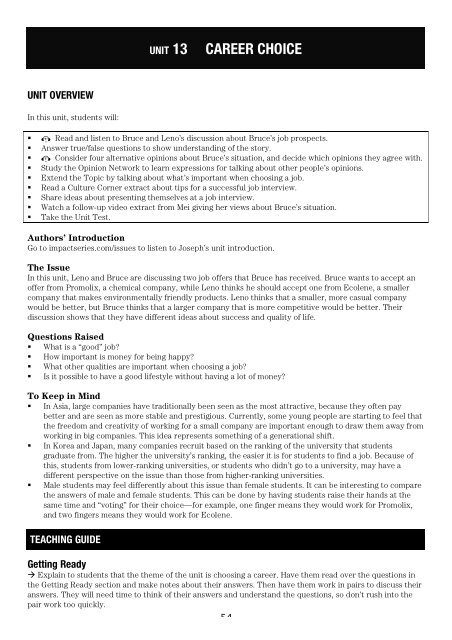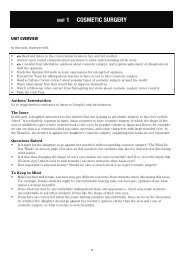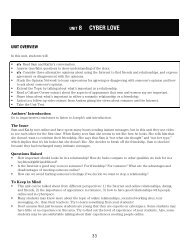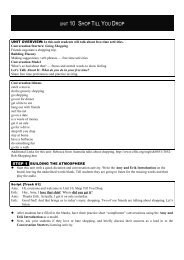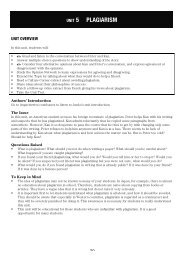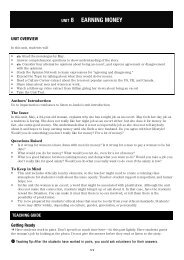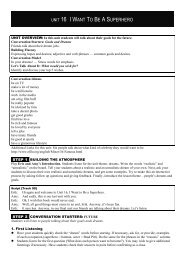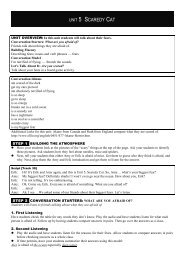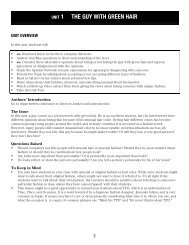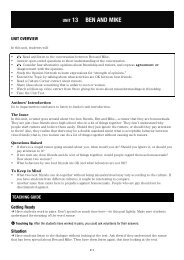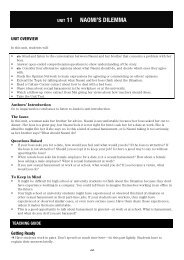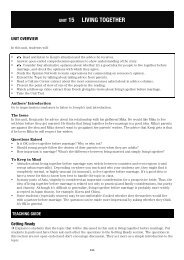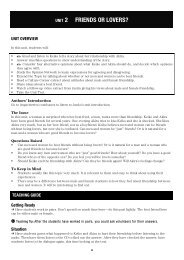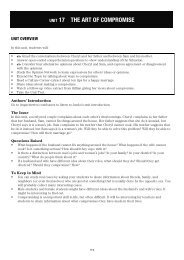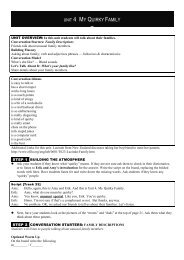UNIT 13 CAREER CHOICE - Impact Series
UNIT 13 CAREER CHOICE - Impact Series
UNIT 13 CAREER CHOICE - Impact Series
You also want an ePaper? Increase the reach of your titles
YUMPU automatically turns print PDFs into web optimized ePapers that Google loves.
<strong>UNIT</strong> <strong>13</strong><br />
<strong>CAREER</strong> <strong>CHOICE</strong><br />
<strong>UNIT</strong> OVERVIEW<br />
In this unit, students will:<br />
<br />
<br />
<br />
<br />
<br />
<br />
<br />
<br />
<br />
T Read and listen to Bruce and Leno’s discussion about Bruce’s job prospects.<br />
Answer true/false questions to show understanding of the story.<br />
T Consider four alternative opinions about Bruce’s situation, and decide which opinions they agree with.<br />
Study the Opinion Network to learn expressions for talking about other people’s opinions.<br />
Extend the Topic by talking about what’s important when choosing a job.<br />
Read a Culture Corner extract about tips for a successful job interview.<br />
Share ideas about presenting themselves at a job interview.<br />
Watch a follow-up video extract from Mei giving her views about Bruce’s situation.<br />
Take the Unit Test.<br />
Authors’ Introduction<br />
Go to impactseries.com/issues to listen to Joseph’s unit introduction.<br />
The Issue<br />
In this unit, Leno and Bruce are discussing two job offers that Bruce has received. Bruce wants to accept an<br />
offer from Promolix, a chemical company, while Leno thinks he should accept one from Ecolene, a smaller<br />
company that makes environmentally friendly products. Leno thinks that a smaller, more casual company<br />
would be better, but Bruce thinks that a larger company that is more competitive would be better. Their<br />
discussion shows that they have different ideas about success and quality of life.<br />
Questions Raised<br />
What is a “good” job?<br />
How important is money for being happy?<br />
What other qualities are important when choosing a job?<br />
Is it possible to have a good lifestyle without having a lot of money?<br />
To Keep in Mind<br />
In Asia, large companies have traditionally been seen as the most attractive, because they often pay<br />
better and are seen as more stable and prestigious. Currently, some young people are starting to feel that<br />
the freedom and creativity of working for a small company are important enough to draw them away from<br />
working in big companies. This idea represents something of a generational shift.<br />
In Korea and Japan, many companies recruit based on the ranking of the university that students<br />
graduate from. The higher the university’s ranking, the easier it is for students to find a job. Because of<br />
this, students from lower-ranking universities, or students who didn’t go to a university, may have a<br />
different perspective on the issue than those from higher-ranking universities.<br />
Male students may feel differently about this issue than female students. It can be interesting to compare<br />
the answers of male and female students. This can be done by having students raise their hands at the<br />
same time and “voting” for their choice—for example, one finger means they would work for Promolix,<br />
and two fingers means they would work for Ecolene.<br />
TEACHING GUIDE<br />
Getting Ready<br />
Explain to students that the theme of the unit is choosing a career. Have them read over the questions in<br />
the Getting Ready section and make notes about their answers. Then have them work in pairs to discuss their<br />
answers. They will need time to think of their answers and understand the questions, so don’t rush into the<br />
pair work too quickly.<br />
54
m Teaching Tip: One technique to use when students do pair work with a list of questions like those in the<br />
Getting Ready activity is to have one student “interview” the other, asking the list of questions. They should<br />
then “check the story” by repeating the information back to their partner. Giving key terms such as interview<br />
and checking the story gives students an overview of the kind of interaction that is expected of them, and<br />
makes the activity more meaningful than simply reading a list of questions.<br />
Situation<br />
Have students work in pairs, with one student taking Bruce’s part and the other taking Leno’s. Have them<br />
practice twice with the book open, then ask them to do the dialogue again without looking at the book. They<br />
should be encouraged to do it in their own words. For students who feel the need to look at the book, tell<br />
them that they may look at the book, but not while they are speaking. They should speak with the book<br />
facedown on the desk, stop talking when they turn it over to refer to it, and then turn it facedown again when<br />
they resume speaking.<br />
m Teaching Tip: The Check Your Understanding questions can be used as “quiz.” With students in pairs, have<br />
them decide who will be student A and student B. Tell student A that he or she is the “teacher” and should<br />
ask the questions to the “student” (student B). The “teacher” is allowed to keep the book open but the<br />
“student” must keep it closed.<br />
Check Your Understanding<br />
Answer Key<br />
1. NI 2. T 3. T 4. F 5. F<br />
What Do You Think?<br />
After you check students’ understanding of the story using the comprehension questions, students discuss<br />
their opinions about Bruce’s situation. Discussion should be done in pairs.<br />
m Teaching Tip: To use this activity for listening practice, have students cover the opinions in the book. Play<br />
the audio and have them check ( ) agree or ( ) disagree in their notebooks for each item. After this, have<br />
them read the items as they listen to see if they understood correctly and if they want to change their<br />
answers.<br />
2 Culture Point: While some may think that accomplishing a lot in life equals success, not every culture<br />
values “doing” to the same degree. Intercultural specialists sometimes divide cultural communities as<br />
valuing one of three value dimensions: doing, being, and being-in-becoming. Western Europe and North<br />
America are considered “doing” cultures.<br />
Extending the Topic: What’s important when choosing a job?<br />
Have students work individually when filling out the job characteristics survey, and in pairs (or threes) for<br />
the follow-up discussion.<br />
Give students plenty of time to read each item. The more clearly they have understood these statements and<br />
thought of their own ideas, the easier it will be for them to do the following discussion activity.<br />
Culture Corner<br />
Have students work in pairs or groups of three. Students read through the list of tips for job interviews. Give<br />
them an opportunity to ask about unknown words. You can ask for students’ general reaction to the tips, or<br />
write a few questions on the board for discussion in pairs. For example: Which tips do you think are most<br />
important. Why?<br />
Extra Activity: Role Play<br />
If there is time, consider doing the Extra Activity, a role play. Set up the role play by dividing the class into<br />
pairs. One member of each pair (student A) is a student who is going to a job interview. The other (student<br />
B) is a friend who works at the company where student A will be interviewed.<br />
Give the students a few minutes to prepare their role play. They can look over the Situation and the<br />
Extending the Topic activity, and write questions and information they may want to use in their role play.<br />
55
Give the students about two minutes to act out their role play. Then you can ask for volunteer pairs to act out<br />
their role play in front of the class.<br />
Note: During role plays, students will make many grammatical errors. It’s usually best to comment first on<br />
their communication strategies: For the interviewee, did you ask a lot of good questions? For the friend, did<br />
you give a lot of detailed information to help your friend?<br />
Sharing My Ideas: Job interview—presenting yourself<br />
Choose<br />
Explain to students that they will be giving a presentation as part of a job interview. Explain that in Englishspeaking<br />
countries, it’s often expected that job candidates can speak about themselves confidently. This<br />
activity will give them the chance to practice this.<br />
Prepare and Rehearse<br />
Students may want to make notes for their presentation on a separate sheet of paper if they find the space<br />
allotted in the book to be too limiting. Encourage students to use key words in their presentation notes, not<br />
full sentences. You may need to demonstrate outlining techniques. Point out the Language Hints and remind<br />
students to use them in their presentation.<br />
The goal of the Rehearse step is not only for students to gain confidence with the material, but also for them<br />
to add more information to their outline if they find that their presentation is not as long as they want. The<br />
teacher can give a length of time (two or three minutes, for example) that students should present without<br />
stopping. With the help of their partner (see the Listener task) they can improve their notes before<br />
presenting again in Step 4.<br />
Sample Presentation<br />
My name is Meera. I’m 23 years old, and I have recently graduated from the university. I have several years of<br />
experience at different part-time jobs. Also, I attend an English conversation school and have been brushing<br />
up on my English. I will talk about an experience I learned something from. In my first year of university I<br />
joined the volleyball team. My university has a very good team, and because I was a volleyball player in high<br />
school I really wanted to take part. One thing I learned from being on the team is that you have to work really<br />
hard! The practices were tough—much more difficult than in high school. But working hard together created<br />
a lot of team spirit. We never won the championship while I was on the team, but we always tried hard, and<br />
we always supported each other. I believe that I can be a good employee because I know that working hard<br />
together is the best way for everyone to get along.<br />
Present<br />
Have students work with a new partner, or put them in small groups. Ask for a volunteer to read the<br />
Presentation Tip. To make sure students understand the tip, you could demonstrate by doing the sample<br />
presentation above. Then draw students’ attention to the Listener task. As the employer this time, they<br />
should take notes during the presentations.<br />
If you are using the assessment guide below, go over each point with the whole class before students begin<br />
their presentations. (This could also be done during the Rehearse step so that students have time to prepare<br />
for or practice each assessment point.) Be sure to remind your students that communicating their ideas is<br />
more important than trying to use perfect English!<br />
Assessing the Activity<br />
Create a handout with a rating grid such as the one below, or simply write it on the board. (Note: For more<br />
information on student assessment and ways to modify the assessment system, see Assessing the Activity,<br />
Unit 1.)<br />
1 – The presenter gave enough information about himself/herself in the introduction.<br />
2 – The presenter’s reasons for being a good employee were clear.<br />
3 – The presentation was long enough.<br />
4 – The presenter was positive and outgoing.<br />
5 – The presenter had clear answers to the employer’s questions.<br />
56
When students are working in pairs, have each student evaluate the other. If a student presents in front of a<br />
small group or in front of the class, have each student evaluate him or her. A rater can give up to 5 stars for<br />
each category, so the maximum score for any presentation is 25 stars.<br />
Of course, you can also give your own assessment, along with positive suggestions for how the presenter can<br />
improve next time.<br />
PERSONAL OPINION<br />
If you have downloaded the video clip or have access to the Internet in class, play the video clip. The first<br />
time, have the students watch with books closed. Ask questions to see if the students have understood the<br />
gist of Mei’s opinion. Then have them look at the summary. See if they can fill in the missing words. Play the<br />
extract once or twice more. Then check the answers.<br />
Answer Key<br />
Mei<br />
This man has a big decision to make. If I were him, I would definitely work for the big company, the company<br />
that pays a lot. Personally, I used to work for a big company. I did it for eight years and it was a hard job. I had<br />
to work a lot of overtime. And sometimes I had to sacrifice my personal time. For example, I couldn’t go out<br />
and have dinner with my friends. I couldn’t meet my boyfriend.<br />
Things like that made the job very stressful, in a way. And I actually didn’t have enough time to sleep, like I<br />
was sleeping only four or five hours a night. But when I was done with one of the big projects, I felt really<br />
satisfied. I felt like I accomplished something really big. And that feeling sort of compensates for everything<br />
else. So I would really recommend working for a big company. Overall, it a good thing.<br />
If I’m this man, I would definitely work for the big company which pays a lot. Um, I used to work for a big<br />
company for eight years, and, um, it was a hard job. I had to do, I had overtime, I worked overtime. And<br />
sometimes I had to sacrifice my private times—I couldn’t go out and have dinner with my friends, I couldn’t<br />
meet my boyfriend. It was very stressful, in a way. Sometimes I, I didn’t have time to sleep. Maybe, like, I was<br />
sleeping only four or five hours a week and it was very stressful, but when I was done with one of the project,<br />
I felt, I felt satisfied and I was, I felt like I accomplished something really big, and I, I can’t—it pays for<br />
everything. It really pays for everything. So I would really try to work for a big company, it’s good thing.<br />
<strong>UNIT</strong> TEST<br />
Make copies of the Unit Test for each student. Distribute the copies and allow about 15 minutes for the<br />
class to complete the test. Correct the test in class.<br />
A. Understanding the Situation: The focus is on understanding the discussion between Leno and Bruce about<br />
which of the two job offers Bruce should accept.<br />
B. Vocabulary: The focus is on words or phrases from the Situation or the Extending the Topic sections.<br />
Students fill in three missing words of a short paragraph that summarizes the Situation.<br />
C. Expressions: The focus is on checking students’ understanding of the What Do You Think? and Opinion<br />
Network sections.<br />
Answer Key<br />
A. 1. d 2. b 3. d 4. b 5. b B. offer, progressive, stress C. 1. a 2. c<br />
LINKS<br />
If you would like the class to do additional research on jobs and salaries, here are some useful links:<br />
Eight factors to help choose the best job for you:<br />
http://www.kiplinger.com/columns/starting/archive/2007/st0418.htm<br />
Online quiz to see what job fits your personality:<br />
http://quiz.ivillage.co.uk/uk_work/tests/career.htm<br />
57


